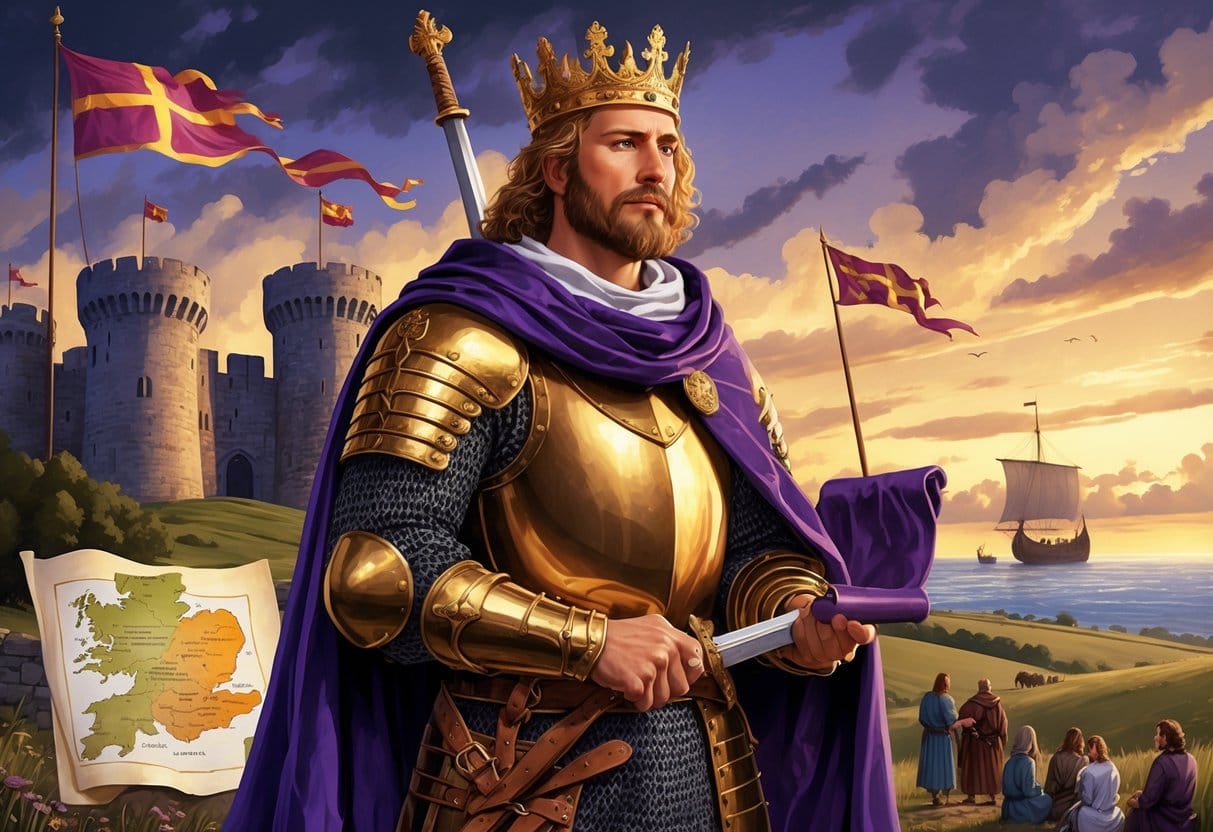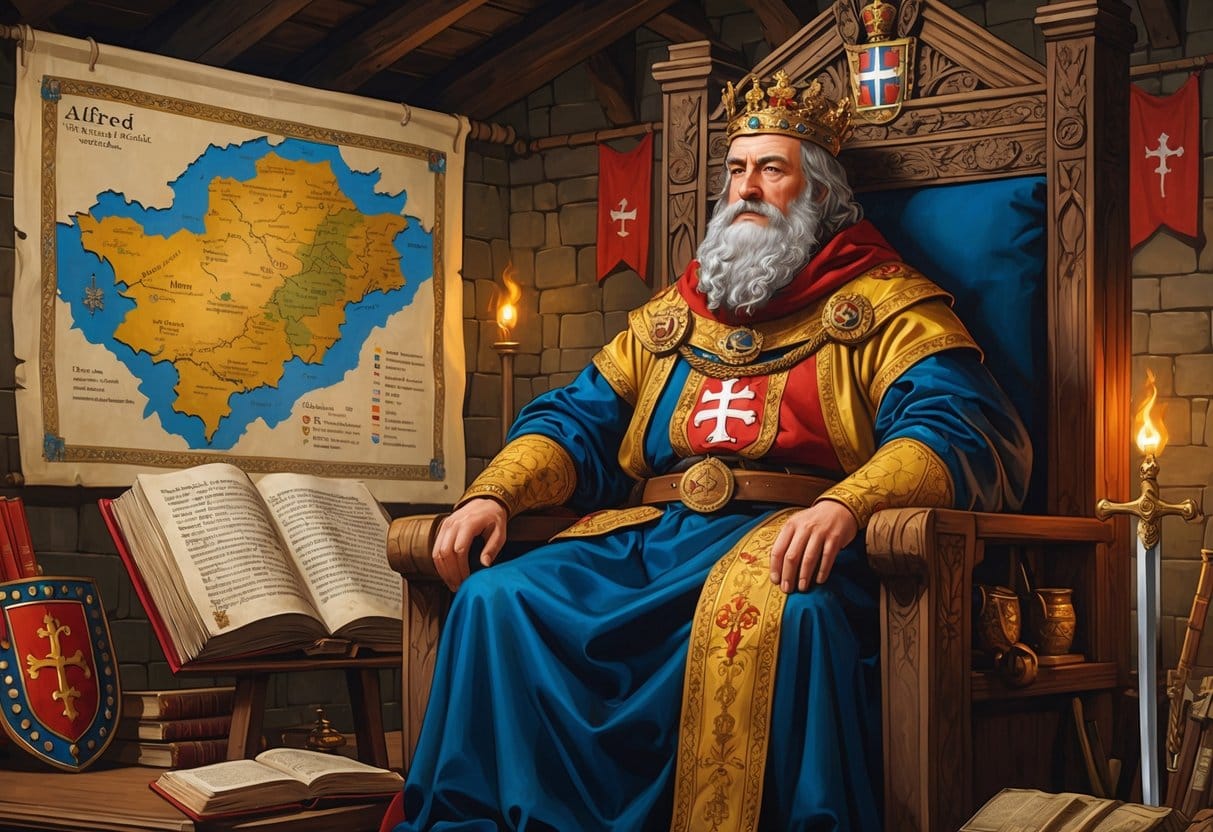Alfred the Great wasn’t just a king—he was the one who pulled Wessex back from the edge and nudged England toward becoming, well, England. Born in 849, Alfred spent his life ruling a kingdom that always seemed to be bracing for the next Viking attack.
He built up defenses, tweaked the laws, and pushed for more learning, which is probably why historians can’t stop talking about him.

Looking into Alfred’s actions, you see a guy who fought for his people and left a mark that lasted. His story? It’s a reminder that one determined ruler really can reroute history’s path.
If you’re wondering why Alfred gets called Wessex’s savior, this guide’s for you. It’s packed with the essentials and a few details that make the past less of a blur.
Key Takeways
- Alfred defended Wessex against Viking attacks.
- He reformed laws and supported education.
- His leadership influenced future English history.
The Life and Achievements of Alfred the Great

Alfred the Great shaped Wessex and stood up to Danish invaders. He mixed military grit, leadership, and legal changes to keep his kingdom going.
His life was a whirlwind of battles, rulership, and trying to unite the Anglo-Saxons.
Early Life and Heritage
Alfred was born in 849, youngest son in the royal family of Wessex. His dad was King Æthelwulf.
He grew up with Vikings raiding all over the place—danger was just part of life. The family’s claim to the throne was strong, which would matter later.
Alfred got a better education than most. The royal court in Winchester backed his learning, and it gave him an edge when it came to ruling.
His early years? Pretty much a training ground for the headaches and dangers he’d face as king.
Rise to the Throne
Alfred became king in 871, after his older brothers died. The Danes had already taken over big chunks of England, so things were shaky.
He had a right to the throne, but he still had to prove he could lead.
Alfred spent those first years fighting to hold the kingdom together. He worked at getting the nobles and local leaders on his side.
He also put effort into shoring up defenses in important towns. Earning respect wasn’t easy, but he managed it when it counted.
Battles Against the Danes
Alfred’s big claim to fame is taking on the Danish Vikings. In 878, things got pretty grim, but then he turned it all around at the Battle of Edington.
Winning there forced the Danes to back off, and suddenly Alfred had a lot more control in England.
He set up fortified towns—burhs—to make Wessex harder to attack. He even pushed for a better navy to chase off Viking ships.
Alfred’s military moves gave his people hope and a bit of breathing room.
Peacetime Leadership and Governance
After the fighting, Alfred focused on bringing order to Wessex. He rewrote legal codes so laws were clearer and fairer.
These reforms helped steady the kingdom and inspired later Anglo-Saxon laws.
Alfred also cared a lot about learning. He started schools and encouraged translating important texts into English.
His court in Winchester turned into a hub for scholars. You can see how his peacetime choices shaped the kingdom’s culture and structure.
Literary and Cultural Legacy
Alfred’s reach went far beyond battles and laws. He pushed for education, backed new translations, and helped Old English literature grow during the early Christian era.
His efforts set the stage for England’s literary and cultural development.
Promotion of Education and Literacy
Alfred really cared about learning, especially when most people didn’t. He wanted folks to read in Old English, not just in Latin.
He set up schools and nudged nobles to get educated. Scholars from other regions were invited to Wessex to teach.
This push helped Old English become a written language, not just a spoken one.
Alfred thought education should be practical. Thanks to him, knowledge survived through the Anglo-Saxon period and beyond.
Translations and Writings
Alfred actually rolled up his sleeves and translated big Latin texts into Old English. He worked on books about history, philosophy, and religion.
He wanted regular people to get access to ideas that were usually locked away in Latin.
He translated parts of the Bible and works by authors like Boethius. Sometimes he pulled in ideas from Greek and Hebrew sources, especially through Christian writings.
Alfred’s translations weren’t always word-for-word. He aimed for clarity, which made them more useful to his people.
This approach helped shape Old English writing and opened up important knowledge.
Impact on Old English Literature
You can credit Alfred’s cultural push for keeping Old English literature alive. He supported writing, which saved oral stories and poetry—think Beowulf and the Exeter Book.
His reign saw prose start to sit alongside poetry. Old English literature got a fresh start, especially after all the Viking chaos.
Alfred’s work gave English literature a real foundation. Even centuries later, his focus on clear language and learning was still echoing.
Historical Influence and Lasting Significance
Alfred changed English history in ways that still matter. He made sure records were kept, laws got better, and his reputation kept growing.
His legacy pops up in religion, law, and even how later generations saw him.
The Anglo-Saxon Chronicle
Alfred kicked off the Anglo-Saxon Chronicle, a year-by-year record that’s still a goldmine for early English history.
It tracked battles, kings, and Viking invasions. Monks kept it up to date, especially at Malmesbury Abbey.
The chronicle helped preserve the story of the English race—its struggles and wins. Historians like William of Malmesbury relied on it later.
Religious and Legal Reforms
Alfred saw religion as key to a strong kingdom. He pushed for the study of holy scriptures and encouraged reading the Church Fathers.
Both nobles and clergy got a boost in education thanks to him.
He updated Anglo-Saxon law with Christian ideas like patience and fairness. The laws kept older traditions but aimed for more peace and justice.
Alfred also encouraged rituals like the liturgy and celebrating the lives of the saints to strengthen faith.
Reputation in Later Eras
Alfred’s reputation grew over centuries. In the seventeenth and eighteenth centuries, writers painted him as a wise, order-bringing king.
During Romanticism, he became a symbol of national pride and heroic leadership.
Medieval stories added miracles and acts of piety, blending fact and legend. He ended up in the tradition of saintly kings who offered sanctuary and justice.
His image became woven into England’s identity, sometimes more legend than fact.
Wessex’s Savior in Modern Scholarship
Historians have spent ages picking apart Alfred’s story. His legacy still shapes how people think about British history.
The work of scholars and the places that keep Alfred’s documents safe help us understand his real influence.
Notable Historians and Works
William Lambard was one of the first to shine a spotlight on Alfred in the 1500s. More recently, Michael Lapidge has dug deep into Alfred’s writings and the world he lived in.
The Life of Alfred—written while he was still alive—is a key source. Archbishop Parker in the 16th century made sure it survived.
Parker also collected other Anglo-Saxon texts, shaping how British history got studied later.
Preservation in Museums and Libraries
If you’re curious about real artifacts, the Bodleian Library and Corpus Christi College in Oxford have manuscripts from Alfred’s time.
The British Museum keeps Anglo-Saxon artifacts, some tied to Alfred’s era.
Sherborne Abbey is another spot with links to Alfred. Monks there worked under his rule, and you’ll find references to his religious reforms connected to the Mother of God and St. Theodore in these collections.
Influence on British Identity
Alfred the Great is still a big name when it comes to British identity. People often remember him as a leader who managed to bring early England together.
He’s credited with defending the land and shaping what would become a unified kingdom. That whole idea of Alfred as “King of the English” really nudged things toward a single nation, and honestly, that matters a lot in the bigger story of Britain.
The legend of Alfred has fueled national pride for centuries. It’s woven into how folks think about leadership and justice in Britain.
His story keeps popping up in conversations about the roots of British law and education. There’s also that stubborn spirit of resisting invaders—Alfred kind of became a symbol for all that, both in history books and in everyday culture.